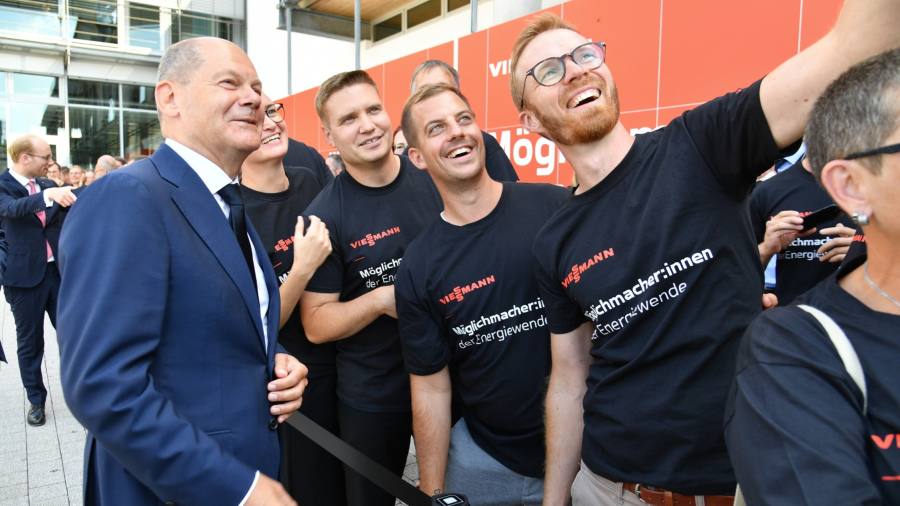
Receive free European companies updates
We’ll send you a myFT Daily Digest email rounding up the latest European companies news every morning.
The listed aspirin-to-weedkiller conglomerate Bayer and privately held heating and cooling maker Viessmann have very little in common. However, both German companies in recent years faced a very similar dilemma: they ended up being too small in an attractive and fast-growing market.
While such a fate may be preferable to being too big in a declining industry, it can be an unfortunate position over the medium term. Bigger rivals can often exploit more economies of scale, deploy larger research capabilities and enjoy more market power. Strikingly, Bayer and Viessmann responded in polar opposite ways to this problem.
In Bayer’s case, its CropScience division, which provides seeds and weedkillers to farmers, feared in 2016 that it could be marginalised as a massive consolidation wave swept through the sector. Bayer decided to scale up, shunning an informal approach by US seed maker Monsanto for its agrochemicals unit. Bayer turned the tables on Monsanto and bought the US company in a $63bn transaction that now ranks as one of the most disastrous takeovers.
Shareholders were unimpressed by the high price as well as debt burden taken on. Moreover, the transaction exposed Bayer to Monsanto’s litigation risk. Bayer was forced to pay $10bn in settlements over Monsanto’s weedkiller glyphosate allegedly causing cancer. Disgruntled investors earlier this year pushed out chief executive Werner Baumann, one of the deal’s masterminds.
Viessmann also has faced a strategic dilemma as the western world scrambles to decarbonise its housing sector. Gas boilers and other fossil fuel heating are to be replaced by electricity-powered heat pumps. While Viessmann has risen to become one of Europe’s largest heat pumpmakers, it fears that bigger rivals in Asia can seize on established global supply chains, operate on lower costs and squeeze players with a limited footprint outside Europe. Moreover, the European market for heat pumps is expected to grow by 25 per cent a year by 2030. Being able to satisfy that demand will require big investment.
Viessmann’s response to its challenges could not have been more different to Bayer’s. The family-owned business, founded in 1917, in effect waved the white flag earlier this year. Chief executive Max Viessmann and his father Martin, who chairs the group, sold the heat pump business to US peer Carrier in a €12bn transaction. While Viessmann will continue to manufacture cooling systems and clean rooms, it is divesting operations that account for 85 per cent of the group’s overall revenue.
Max Viessmann says that the decision to sell the business was anything but easy. He says it was taken as it was the best way to secure the jobs of the 10,800 employees in the heat pump business who will also collectively receive a special bonus worth €106mn. After the announcement of the deal, the CEO shed tears. Moreover, the company found itself in a political tussle as conservative politicians made a fuss about an alleged sellout of a company from the famed German Mittelstand and accused the country’s left-of-centre government of undermining Viessmann’s business case — a view that is at odds with the family’s own rationale for the sale.
What seems particularly remarkable about the Bayer and Viessmann cases is that they appear to turn clichés about corporate decision-making upside down. Normally, listed firms that are accountable to cold-blooded shareholders are expected to take sober, hard-nosed decisions which, if necessary, ditch decades of corporate legacy in a blink. By contrast, tradition-rich family firms are thought to dither when it becomes necessary to prune a company.
In Bayer’s case, it appears that its salaried managers resisted a break-up of the company that in hindsight would have realised more shareholder value than its scale-up strategy. As people close to the company insist, a key argument made against selling Bayer’s agricultural business to Monsanto was that the remaining pharma division would then be so small that it could easily become a takeover target.
It is too early to tell if Viessmann’s decision will stand the test of time. Similarly sized German heat pumpmaker Vaillant, which is also privately held and family-owned, is adamant it is not structurally too small. But regardless of the ultimate outcome, the political opprobrium and Max Viessmann’s tears already show that dismantling a successful company is a difficult decision. That does not mean, however, that it should be dodged.